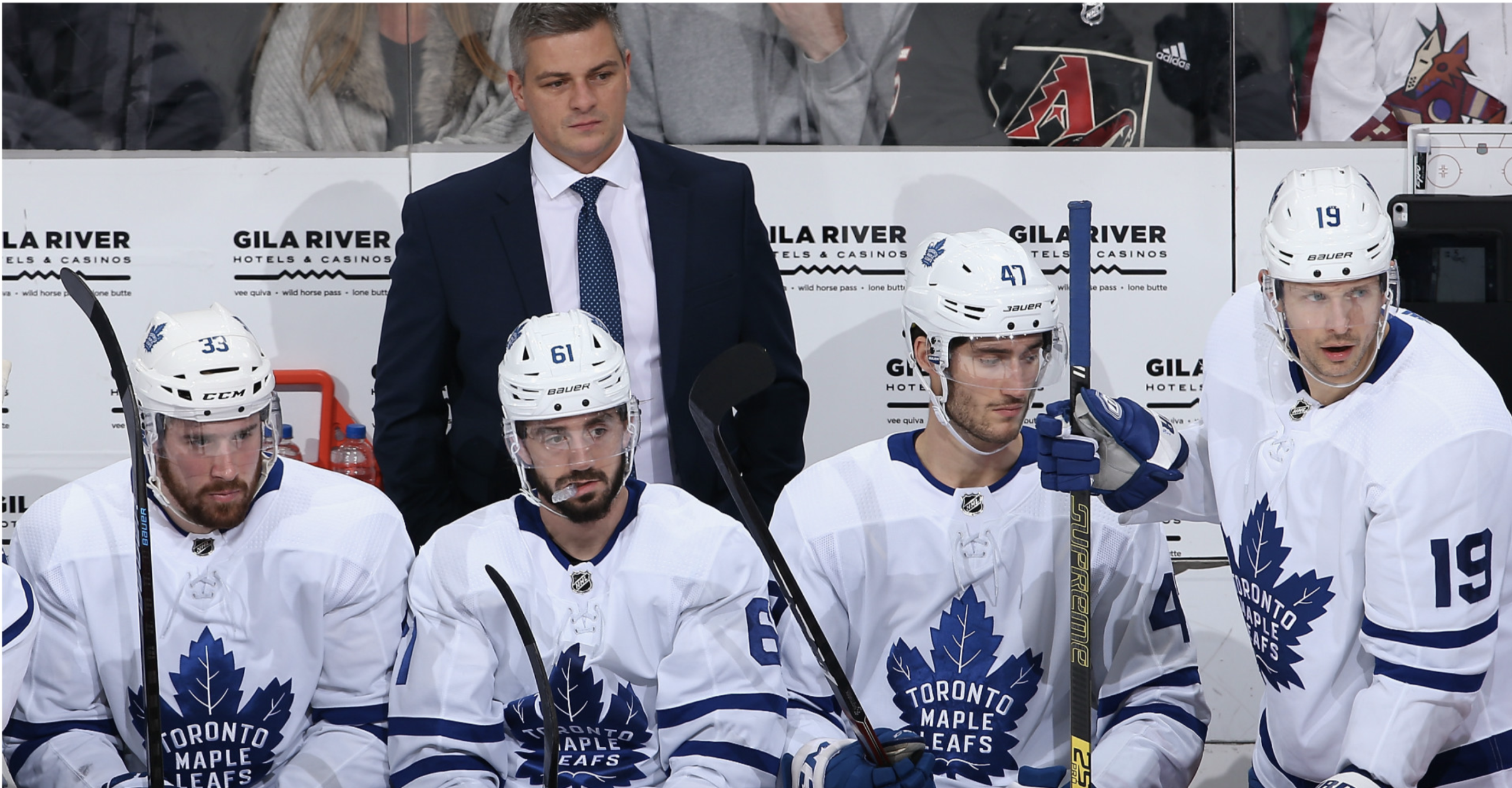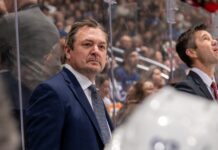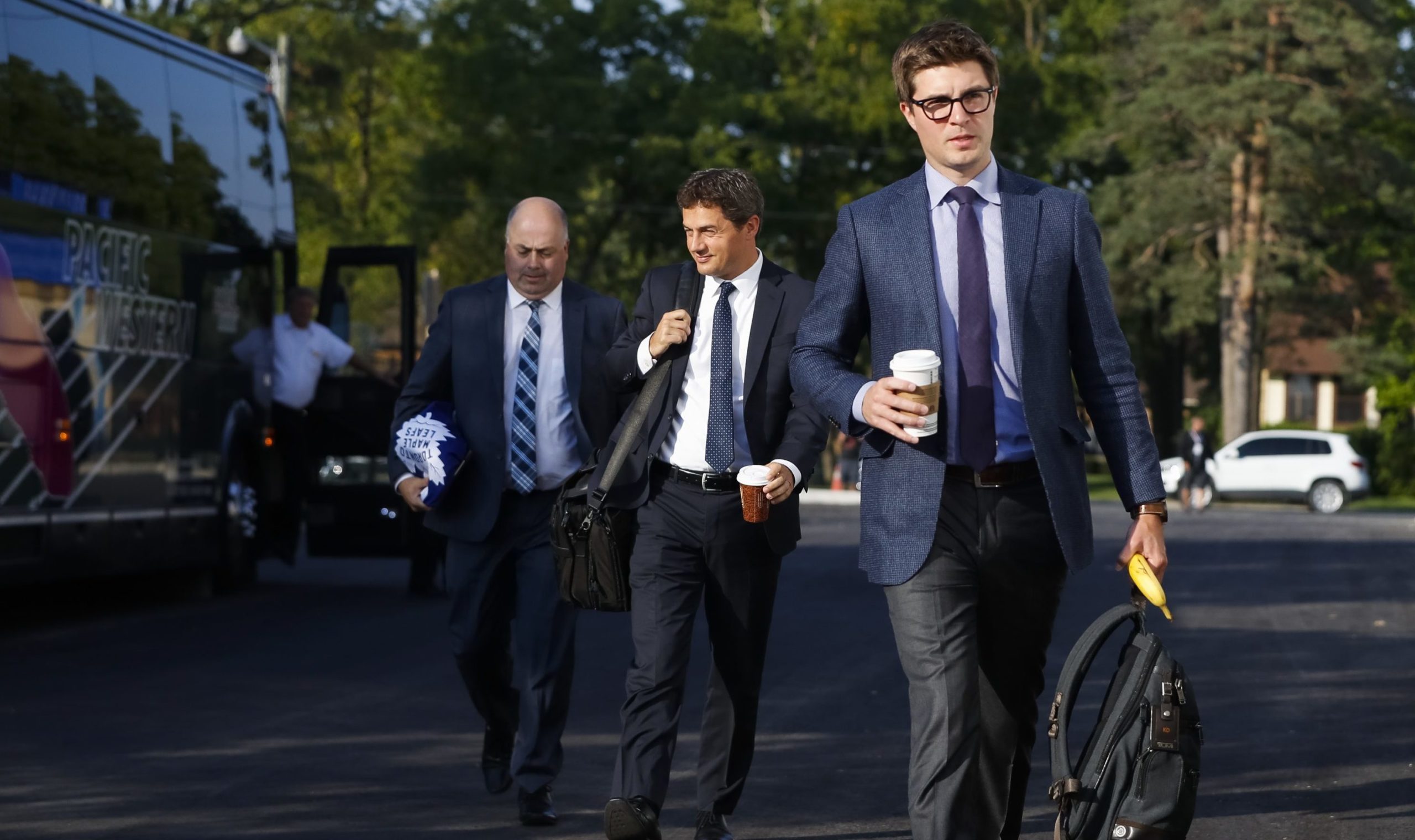Toronto Maple Leafs General Manager Kyle Dubas joined TSN Overdrive to discuss Sheldon Keefe’s approach to training camp, the team’s efforts to develop its defensive mindset, and the matchup versus Columbus in the playoff qualifying round.
How does this compare to a normal training camp? Do the first couple of days feel like the first couple of days of a September camp? Are your goals the same for these couple of weeks as they would be for two weeks in September?
Dubas: I would say the feel of it has been totally different than a September camp. I think there is just much more urgency. The pace and competitive nature of things are much higher now than I’ve seen in September camps.
Even the camps in September, I think everybody knows it’s three days of practicing and intrasquad games and then a break and right into two weeks of exhibition and practice. This is two weeks of actual preparation — training camp, practicing, one exhibition game, and then right into playoffs.
It is a confluence of two things: 1) That we are going right into the playoffs after one exhibition game; 2) It is Sheldon’s first time to really build the foundation that he wants. He is doing that heading into a playoff atmosphere, not a gathering of exhibition games to get ready to roll. That is the big difference that I have seen so far.
How many changes can we actually expect here when you consider it is the same coach and the same players, but it’s Sheldon Keefe’s first training camp? What is realistic in terms of philosophical changes that Sheldon can make over the next two weeks?
Dubas: I think the primary focus when Sheldon came in, based on the talent of the team… and I’d let him speak to this better than I can, probably. At that point, we were not in a good spot. We were in 25th in the league. The team is obviously built around talent. I think a lot of the focus at that point was getting our talent to come to the forefront and getting them up and rolling.
We got off to a pretty good start with Sheldon up until early January there, and then we kind of — whether it was just injuries or general inconsistency — would run really hot and cold. The focus right now is building ourselves into a complete team — more with our mindset than anything else — on the defensive side.
By all measures, offensively, we come out pretty well. If we are going to go from being a good team to a perennial contender, we need to really shore up our defensive side of it. I am not so sure that is a personnel or systems thing. I think it is a mindset of our entire organization. That is where a lot of our focus will be here and how Sheldon will try to round out what he is trying to do as the coach of the club.
How do you do that with the mindset and focus on defense when it is something, presumably, most of the players have heard at many points in their lives?
Dubas: We have had good examples throughout the year and we have had other teams that have dealt with the same thing and have overcome that same hindrance or criticism in order to move from a team that just started making the playoffs to actually contending.
We have also shown it this year. I will just go back to our last game that we played because it is the freshest in mind. We had come off a bad trip coming to California. In the first period against Tampa Bay, we had the puck the whole time. When they got the puck, we got it right back, denied them a lot, and they are obviously a very talented offensive team.
We have shown in spurts that when we are locked in and ready to roll, we can be an excellent team at both ends. It is just now finding that as consistently as possible and as often as possible in order to reach our potential. I know that everybody would like the lineup to be balanced between offense and defense, but as we’ve seen — and I don’t like bringing this game up — in the game against Carolina where David Ayres came in, they were down a defenseman in Brett Pesce and Dougie Hamilton wasn’t playing, either. They just showed that when you are fully committed to defense and you are playing with extreme desperation, you can really deny anybody anything you want.
We’ve shown some of that in spurts against some very good offensive teams — Tampa Bay at home, Pittsburgh at home — and now we just need to show that we can do that all of the time. That will be the message Sheldon will be preaching here as we get rolling.
In such an unprecedented situation, do you see this as a real opportunity to evaluate who is actually locked in and who is truly prepared? If so, how can you use that evaluation to make a decision on how you build your team in the future?
Dubas: This was a very strange time — the pause right as the season was about to enter its most important time. We had guys who we thought were ramping up. We’ve come off of a win against Tampa at home. We’ve had some great games in that preceding two-and-a-half week stretch, whether it is at Tampa and at Florida, and then home to Tampa again. And then mixed in were some of the things that plagued us, whether it was at San Jose or Anaheim, where we didn’t play overly well.
I think that we have tried to tell our players, and what we need to do as an organization, is that when things aren’t perfect or things are difficult, we need to be able to become a team that does not let that distraction impair us from performing.
In the past, one of the things that I have often disliked about the way we’ve handled it is when we are in back-to-backs or when the schedule wasn’t favorable, or we had injuries. I have often found that we spent a lot of our time and energy complaining about that versus saying, “Every team deals with this.” Our opponent in Columbus has probably done the best of this with over 400 man-games lost to injury. They never let that impede them or slow them down.
With our talent, if we can develop that same mindset, that will get us to the point where we want to get to and with our talent, where we think we can get to. We have to go out and do it. This break was a great opportunity for Sheldon and the coaching staff to really begin to develop a greater relationship with the players after coming in mid-season and work with them more one-on-one without the daily regiment of practices and games influencing how much time he can spend with everybody.
I think that will be a really positive thing. Also for us, it allowed us the chance to really hammer home to various players on the team what we were expecting — not only in their on-ice play but in their off-ice engagement and so on and so forth — and try to take steps forward and continue to progress as a team.
How did Sheldon do that? Was it sending video clips with regular contact via email and text? How did he go about fostering these relationships with his players when he hasn’t had that foundational time with them at camp?
Dubas: The thing that I was probably most impressed with is that Sheldon and the coaching staff took time to dig deep into every player’s game and used all of the departments we had here — whether it’s player development, R&D, coaching, hockey operations in general — and take this time to build a stronger database, which you probably wouldn’t be able to do as a coaching staff in mid-March and April when you are in the stretch drive and playoffs.
They used that to then open dialogue with the players about what they saw their strengths as versus what we saw their strengths as a team, and where they wanted to invest their time in development versus what we do. Obviously, the common ground is easy because you can develop a plan and work. The contrast between the player and the team were, rather than avoid them, Sheldon wanted to sharpen. We wanted to go down the path of really building a strong plan with the players, especially where they may see themselves in a different way than we do. You can learn from that as a team and as a player.
The way Sheldon handled it is as personal as possible during this time — a lot in video conferencing rather than in phone calls and text. From the sounds of it from the players, they appreciated the personal touch of it, whether it was working with Sheldon or our other coaches on their development plan. That element always helps the relationship between the player and the team.

Does the fact that Sheldon is a little bit younger mean he has a different way of conversing with the players and does it make those moments where there is disagreement easier to work through than like with the previous coach, who might have been more intimidating? Does Sheldon have a different kind of dynamic to him?
Dubas: Especially with where Sheldon comes from with the Marlies and the development time you have with the Marlies or going back to the Soo or Pembroke even, I think the language he spoke there has been very helpful here. The players here, especially the top players, want to continue to develop and continue to grow their games. They don’t want to have other, younger players start to pass them by. They want to remain at the top of their game as much as possible.
I think that has been the most refreshing part about being here. You kind of wonder, when you are with the Marlies or in the Soo… Guys are always looking to get better no matter what, but when they get to a certain point, are they going to become complacent or rest on that? Our guys who people would probably say are the most talented are the ones who want to put in the most work on that front. I think that has made it easy.
On the areas where there is a disagreement between the player and the team on where things stand — and Sheldon can probably answer this better than I can — at this level, everything isn’t done in generalities. It is done by digging deep into the player and where they are at. He will build a case showing exactly what he means versus just saying it and a player disagreeing. The technology we have now and the resources we have now allow us to build out an actual case rather than just speak in general terms about the one time we saw them do something wrong that is stuck in our mind and is biasing us.
That is the way that Sheldon and the staff have operated in the time I have worked with him. I think it eliminates a lot of that. Maybe you’re a little bit sensitive to parts, like any of us are when people criticize us — especially from people who are our bosses — but when they come at it from an objective [place], where you know they have spent a lot of time to try to help you, I think that helps and goes a long way despite the initial un-comfortability.
Auston Matthews went on the record confirming a report from weeks ago that he tested positive for COVID-19. What was your reaction to that news?
Dubas: You’re concerned, obviously, about all of your players’ health at all times and their wellbeing. It is a personal matter with him, so I don’t want to get too deep into it, but he was great and his camp was great in certainly keeping us up to date. It was more of a medical matter than a managerial matter. My major point of concern was just Auston’s wellbeing and his health, and we’re happy that he is here and fit to roll.
Any concerns about performance and him being in shape, or does he just look like the same old Auston Matthews?
Dubas: When he has the puck on his stick and he shoots it, for me so far, he looks the same. It goes in the net usually. That is positive. Like a lot of these guys, they are all working to get back into their top condition. No matter what you can do in the offseason on your own or even in small groups, it is a lot different when it becomes actual practices and as competitive scrimmages as you can get. I think everybody is a bit behind where they want to be, and we look at it as an opportunity to get into the best possible spot conditioning-wise and technically.
You guys are going to be Ubering into the hub when everyone else is flying into the hub. Is this possibly going to be an advantage? You guys are going to be staying in hotels, but the fact that you are going to be playing at Scotiabank, how might it benefit your team?
Dubas: The benefit is that we don’t have a flight in. I think our plan will be to practice and then probably bus in safely, or whatever mode of transportation they say is correct for us. In terms of an advantage at Scotiabank, we won’t have our dressing room for all games. When we are the home team and are assigned it, we will get it, but otherwise, we will be in the visitors’ room or elsewhere. We won’t have any other increased access to the arena.
The familiarity of the ice is nice, but there are no fans and I think everything will look quite different just in terms of how they are setting up both buildings for television and other things. I don’t even know how familiar it will be other than everyone on our team generally knows how to get there. Because we are coming from 50 feet away, that won’t be difficult, either.
I don’t know what the advantages will be other than the flight. Certainly, not having to get on a flight for ourselves and Edmonton is likely a positive, but we are not going to have access to any of our amenities there anyway, so I am not sure, in the end, it is going to matter much. It is such a strange experience for all of the players, especially in the playoffs.
You mentioned your team didn’t always respond when the game got a little ugly or difficult. That is something that Columbus will try to do. They have a good team and they make it hard. They won’t let it be a pretty game. How much of the next two weeks is focused on the Leafs and how much is focused on Columbus?
Dubas: The major focus and where we have to spend a lot of our time… We know that it is a difficult opponent. Nobody here is underestimating the Columbus Blue Jackets. They have an excellent coach in John Tortorella. The core of their group and the leadership of their group — whether it is the Folignos, Atkinsons, Werenskis or Jones — have been together for a long time.
They obviously notably had some players move on at the end of the year and I thought that only made their identity stronger and how they played and their ethos more pronounced. I thought they had a great season going and they were able to continually put up wins despite missing a lot of players throughout the year. They saw development from a lot of the guys in the group, whether it was Dubois or Bjorkstrand at different times, and they are very, very dangerous players. We know that they are not going to give us anything when we go into the series with them. We know what to expect with them.
On that note, our focus is going to be on getting us to be the best version of us going into the entire event. We have to play them first. Our goal is to win 19 games and we have to set ourselves up as best we can to do that. The first step to us giving the Toronto Maple Leafs a chance to do that is becoming a team that has that mindset at both ends of the rink every night and is able to be a top-end team at both ends of the ice every single night. That is where we are spending a lot of our time and focus right now — on that mindset and developing that same tenacity that every team that wins has, especially on the defensive side.
On offense, we rank near the top, but teams don’t generally win when they lag behind on a lot of the metrics defensively. Whether it is shots against, goals against, chances against — whatever you want to use — we know that if we are going to go from being a good team to a great one, we have to become a top-10 team in those areas as well. That is what the majority of our focus is on here now.
We spend a lot of time internally discussing whether it is personnel or systems. We look at teams that have similar personnel and systems and we go right to that their mindset is a little bit more consistent day in and day out. That is what we have been focusing on here.















![John Gruden after the Leafs prospects’ 4-1 win over Montreal: “[Vyacheslav Peksa] looked really comfortable in the net… We wouldn’t have won without him” John Gruden, head coach of the Toronto Marlies](https://mapleleafshotstove.com/wp-content/uploads/2025/09/gruden-post-game-sep-14-218x150.jpg)


















